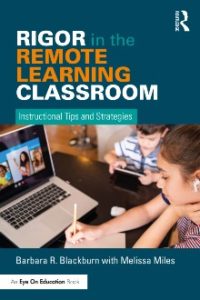Keep Remote Learning Robust and Rigorous
Rigor in the Remote Learning Classroom: Instructional Tips and Strategies
By Barbara R. Blackburn with Melissa Miles
(Routledge/Eye On Education, 2020 – Learn more)
Reviewed by Michael McLaughlin

I vividly recall spending that mid-March weekend developing a remote learning schedule and running Zoom tutorials for faculty so that our school could launch a fully synchronous model of Remote Teaching and Learning two days later.
While we were – and are – operating our school in the midst of a global health crisis, we do so mindful of the fact that the fundamentals of effective teaching and learning are not themselves in crisis. Indeed, teachers should lean into those methods all the more.

Blackburn presents a framework for teachers to adapt to remote learning not by lowering expectations for their students or themselves, but rather by developing a scholastic environment rooted in rigor.
Defining Rigor
Blackburn defines rigor as “creating an environment in which each student is expected to learn at high levels; each student is supported so he or she can learn at high levels; and each student demonstrates learning at high levels.”
For Blackburn, effective teaching is not rigor for rigor’s sake. Rather, rigor is a mindset that animates learning with vigor – life. Open-ended questions that require students to think critically are central components of this approach. Students are able to demonstrate their learning and earn success through tasks and assignments that engage their minds and sustain their curiosity.
Throughout our lessons and assessments, our students are challenged but we also provide them with appropriate support as they internalize and apply skills and processes.
Pedagogical Practices: A Framework for Planning
Blackburn’s opening chapter explains the Task Cycle. The chapter zeroes in on the importance of planning with the purpose and product of the task as the drivers for instruction. Novice and veteran teachers alike will find Blackburn’s explanation and planning templates helpful.
Core to Blackburn’s approach to planning is the importance of effective questioning. Blackburn posits that it is the types of questions teachers ask that most significantly contribute to a classroom climate of high expectations and rigor. A series of question stems and starters, classifications of questions, and habits of effective questioners are among the chapter resources that teachers can add to their toolkits.
Research, Resources, and Ideas: Tips to Adapt to the Remote World
Each chapter opens with a reminder of what high quality instruction looks like in a traditional classroom setting. Blackburn presents a key practice that contributes to rigor and demonstrates that concept at work in the remote setting.
Tables, templates, and resources are geared towards teachers of various academic disciplines and grade levels, inviting educators to reflect on their current practice and develop an action plan to adapt to digital delivery and do so with rigor in mind.
For example, the chapter on Scaffolding and Support, a refresher on gradual release, provides context for utilizing strategies like graphic organizers, guide-o-ramas, and metacognitive discussions about active reading and critical thinking.
In considering the ways in which the remote setting presents new opportunities for teaching and learning, Blackburn organizes apps by how these platforms advance the dispositions and competencies to wonder and create, to collaborate and discuss, to create and act, and to analyze and reflect. This underscores the importance that educators construct their lessons and use tools with intentionality and purpose.
Subsequent chapters are filled with tips, strategies, and questions for teachers to consider as they transition to the remote environment with rigor at the forefront. Topics include establishing norms for online conversation, writing for authentic audiences and with purpose, analyzing sources and perspectives, activating prior knowledge, formatively assessing skills and content, providing feedback, designing projects, differentiating instruction, summative assessment, and the evaluation of student work.
Chapters conclude with a summary recap and several points to ponder, inviting reflection and the creation of an action plan for various elements of instruction.
I used Backburn’s reflection questions with our faculty to reimagine some of the hallmark learning experiences of our Middle School this year. Our annual sixth grade Egyptian Museum is an interdisciplinary capstone that builds from students’ study of ancient Egyptian civilization in their Humanities classes. She offered several ideas for lessons and alternative assessments that helped us develop a remote approach to the capstone while maintaining the rigor and vigor that characterized the in-person delivery.
From Crisis to Control
Rigor in the Remote Learning Classroom is a valuable guide that will help teachers and school communities reframe the conversation about remote teaching and learning. Remote delivery is not a roadblock – it is a reality to which teachers must and can adapt as our world navigates the “new normal.”
Blackburn’s book will help teachers and schools to consider how to make that remote approach one that is both robust and rigorous.
Michael McLaughlin is the Head of Middle School at Austin Preparatory School in Reading, Massachusetts. The 2019 recipient of the A+ Administrator Award from the New England League of Middle Schools, McLaughlin is also a curriculum author for the Sophia Institute Press, a guide with the National Geographic Educator Certification program, and a freelance travel writer. McLaughlin is a board member of Buckingham Education Limited in the United Kingdom where he advises on virtual learning.




























